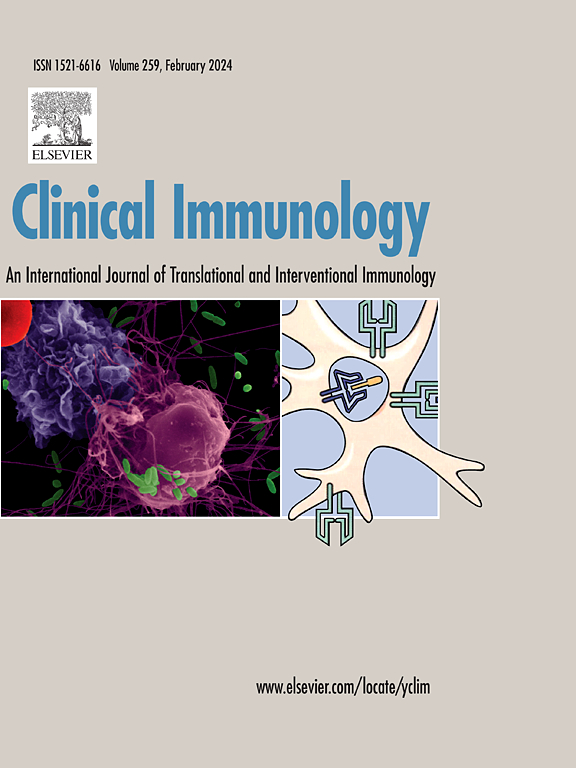滑液中的常驻滑膜巨噬细胞:对免疫调节的影响。
IF 3.8
3区 医学
Q2 IMMUNOLOGY
引用次数: 0
摘要
常驻滑膜巨噬细胞(rsm)是一种抗炎、自我更新的巨噬细胞,可从外周免疫系统中提供关节间隙的物理免疫隔离。该结构的通透性增加与滑液(SF)中的外周免疫细胞有关。通过组织组织学可以直接测量滑膜屏障的完整性,但在屏障破坏后,这些细胞是否会在SF中延续或引发慢性炎症尚不清楚。我们试图确定人类SF中的RSM作为滑膜屏障完整性的间接测量。为了验证研究结果,我们利用人类滑膜建立了一种新的体外移植模型。scRNA-seq显示,这些SF rsm上调炎性关节炎的促纤维化和促破骨细胞通路,但不上调感染性关节炎的促纤维化和促破骨细胞通路。SF中rsm频率的增加与sRANKL的增加有关,而与潜在病理无关。这些发现表明,SF中rsm的频率可能与滑膜屏障损伤有关,进而与关节结构的潜在损伤有关。本文章由计算机程序翻译,如有差异,请以英文原文为准。

Resident synovial macrophages in synovial fluid: Implications for immunoregulation
Resident synovial macrophages (RSMs) are anti-inflammatory, self-renewing macrophages that provide physical immune sequestration of the joint space from the peripheral immune system. Increased permeability of this structure is associated with peripheral immune cells in the synovial fluid (SF). Direct measures of synovial barrier integrity are possible with tissue histology, but after barrier breakdown, if these cells perpetuate or initiate chronic inflammation in SF remains unknown. We sought to identify RSM in human SF as an indirect measure of synovial barrier integrity. To validate findings, we created a novel ex vivo explant model using human synovium. scRNA-seq revealed these SF RSMs upregulated pro-fibrotic and pro-osteoclastic pathways in inflammatory arthritis, but not septic arthritis. Increased frequencies of RSMs in SF was associated with increased sRANKL regardless of underlying pathology. These findings suggest the frequency of RSMs in SF may correlate with synovial barrier damage and in turn, potential damage to joint structures.
求助全文
通过发布文献求助,成功后即可免费获取论文全文。
去求助
来源期刊

Clinical immunology
医学-免疫学
CiteScore
12.30
自引率
1.20%
发文量
212
审稿时长
34 days
期刊介绍:
Clinical Immunology publishes original research delving into the molecular and cellular foundations of immunological diseases. Additionally, the journal includes reviews covering timely subjects in basic immunology, along with case reports and letters to the editor.
 求助内容:
求助内容: 应助结果提醒方式:
应助结果提醒方式:


